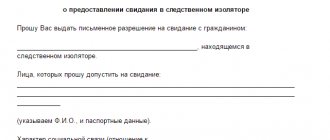The online service FSIN-PISMO at: https://fsin-pismo.ru allows you to send messages to pre-trial detention centers and correctional colonies, receive response letters from the addressee and delivery reports.
Using the website fsin-pismo.ru , you can send an electronic message and photographs to your loved ones anywhere in the country, if the institution is registered in the system.
You can send messages through the FSIN-LETTER service at any time of the day or night, without fear of their loss or leakage of personal data.
With the help of this service, emails will quickly reach the recipient and will be received by him in printed form, but only if the information about his location is correctly specified and censorship rules are observed.
How to correctly write a letter to a pre-trial detention center (SIZO) or colony (IK)
In order to send an email message, you must go to the FSIN service using the link - https://fsin-pismo.ru/client/app/letter/create.
On the page for sending a message to the Federal Penitentiary Service, fill out all the fields and enter the text of the letter, indicate your email address and telephone number.
Required fields:
1. To: select the region (see above) - enter the first letter of the departure region and activate the desired entity from the drop-down list;
2. Where: select an institution (see above) - click on the field and you will see all available institutions located in this region. Select the one you need from the list;
If a message with a green circle “You can send letters, photographs and receive answers” is displayed below, this means that the connection with the pre-trial detention center or correctional facility is established and working correctly:
3. To: last name, first name, patronymic and year of birth of the recipient - enter the correct data of the recipient;
4. From whom: full name, phone number, contact e-mail – enter your details. In the “Confirm e-mail” field, duplicate the mailbox address that you entered in the “Contact e-mail” column.
Be sure to click the “Remember my data” checkbox so that the service remembers your data and you do not have to enter it again. This is convenient if you write regular letters.
5. In the “Letter text” box, write the message you want to send to the prisoner. The volume and cost of the finished text will be displayed at the top of the field to fill out. You can monitor changes in these indicators in real time while writing a letter:
Remember that your letter will first go to censors and only after passing censorship will the letter be delivered to the addressee.
If you want to supplement the letter with a photo or receive a response from the addressee, check the corresponding boxes located immediately below the sending text field “I want to receive a response to this letter” and “Attach a photo.” They will appear automatically as soon as you start typing text in the “letter text” field indicating the price of the service + 55 rubles and + 30 rubles:
The “FSIN card details letter” section is optional. It is intended only for those users who have special FSIN payment cards (see below). If there is such a card, then in this field you must indicate the number and authorization code.
6. Next, click the “Send letter” button:
After you have sent the letter, you need to pay for it.
What is important to know so that the letter quickly reaches the addressee
In order for the message to reach the recipient as quickly as possible, it is important for the user to fill out the sending forms correctly. Thus, it is necessary to carefully check information about the prisoner’s name and date of birth.
As a rule, many letters are eliminated during censorship. In this regard, it is important for the sender to write it as concisely as possible and not to touch upon topics that may cause increased interest among prison staff (for example, not to discuss the nature and subtleties of the criminal case). All confidential issues can be discussed during a long date.
How to pay for a letter
You can pay for the FSIN in five ways:
Payment with a special FSIN-letter card.
If you already have a card, then you need to enter the card number and authorization code in the appropriate fields of the section “Federal Penitentiary Service Card Details-letter” before you send the letter:
Important: When entering a number, only numbers are used, alphabetic characters are not entered..
And only after that you need to click the “Send letter” button. In this case, the money for the letter will be automatically debited from your FSIN-letter card and the letter will immediately arrive at the e-mail department of the pre-trial detention center or the recipient's correctional facility. Moreover, you will receive an email notification that the letter has been received by the censor for verification. After checking the letter by the censor, the letter will be delivered to the addressee. You will also receive a notification about this by email.
Payment by bank card, from a mobile phone account, via an electronic wallet or by bank transfer by receipt
If you do not have a FSIN-letter card, then after filling out the “Text of the letter” field, you should click the “Send letter” button. Next, a letter will be generated and you will need to select a payment method by credit card, from a mobile phone account or through an electronic wallet. You can also print out a receipt and pay it at the bank. You can pay for the letter within almost a month.
On your computer screen you will see a message that the letter has been generated, the letter number, by what date it must be paid and your email address:
You will also receive a letter from the FSIN-LETTER service to your email box with a message that the letter has been generated and you need to pay for it. You can always pay for it via email.
If you want to pay for the letter immediately, then select the payment method and click the appropriate button. The service will redirect you to the INVOICE BOX payment system platform, where you need to select a payment method and click the green button:
Please note that the price differs depending on the payment method.
The letter will be received by the pre-trial detention center or correctional facility only after payment has been received.
What not to write about
Every message sent to a prisoner in a pre-trial detention center is checked by a censor. The content should avoid the following topics:
- The circumstances of the criminal case against which the addressee is charged. It is better to avoid any information and facts.
- Previously committed actions of the prisoner while at large, as well as events from his life that aggravate his guilt.
- Mentions of other persons involved in the criminal case.
- Methods of communication with prisoners prohibited by the internal regulations of FSIN institutions (mobile phones, etc.).
- Any information relating to drugs, weapons, extremism.
- Personal attitude to the case under consideration and the constitutional system of the country.
If such information is found in circulation, the administration of the pre-trial detention center has the right to transfer it to the investigator. In addition, there is a possibility of dishonest work by the staff of the pre-trial detention center and the subsequent transfer of any information to the criminal environment.
You need to write as simply as possible. You cannot use signs, symbols, or marks that could be perceived as a code. Profanity and jargon are not allowed in correspondence.
It is best if the content of the message contains information about the health of relatives, the success of children, and any significant events for the family.
How to order and receive a payment card FSIN-letter
The fastest way to guarantee instant transfer of funds is a special FSIN card. There are 5 types in total. They differ in denomination. The most budget FSIN card is issued with a balance of 330 rubles, the most expensive – 5,500 rubles. In addition, the sender can purchase an electronic card for 550, 1100 and 2750 rubles.
The FSIN-letter card is the most convenient method of payment, since you just need to indicate its details in the system and the funds for the shipment will be debited automatically. If you pay for a letter with such a card, the time it takes for funds to enter the system is significantly reduced and your letter will reach the addressee much faster.
In order to purchase a special payment card, go to the main page of the FSIN-LETTER service: https://fsin-pismo.ru/client/app/letter/create
and in the upper left corner select the “Payment Cards” button:
In the window that opens, fill out an application for a FSIN card:
- Choose the desired card denomination: 330 rubles, 550 rubles, 1100 rubles, 2750 rubles. or 5500 rub.;
- Enter your full name, phone number and email twice.
- Next, click the “Order” button.
In the header of the window that opens, you will see a message that the FSIN-LETTER card has been generated and its denomination and your personal data will also be displayed. Please check them again before making your final payment. Then in the window that opens, select the payment method that is most convenient for you:
You will also receive a letter from the FSIN-PISMO service to your email box with a message that the card has been generated and you need to pay for it. You can always make payment from an email.
If you want to pay the card immediately, then select the payment method and click the appropriate button. The service will redirect you to the INVOICE BOX payment system platform, where you need to select a payment method and click the green button:
transfer money to your account and wait for the notification of their crediting, which will arrive in your mailbox. The same letter will contain an authorization code that you can use to pay for electronic shipments from the Federal Penitentiary Service.
What can you put in an envelope?
In the envelope you can also send:
- photographs of loved ones and relatives;
- envelopes, stamps;
- one pocket calendar;
- children's drawings, poems.
To be completely sure that everything enclosed will reach the addressee, it is necessary to indicate the name and number of items at the end of the message. The usual limit on the number of photos is 5 pieces. Attach several envelopes and stamps to each letter; in such institutions it is not always easy for prisoners to get them.
Remember that erotica and pornography are prohibited in pre-trial detention centers; you cannot send photographs of such content.
Cost of letters
The FSIN letter service is an official resource for sending letters to people in prison. The price of the services offered on it is affordable to everyone. For one page of text up to 2500 characters you will pay only 55 rubles, for two sheets of text - 110 rubles.
The maximum size of one FSIN letter of 8 pages will cost the sender 440 rubles.
You will have to pay separately for services such as including a photograph and the addressee’s response in the FSIN letter. The cost of one photograph, which is printed by the receiving party on plain paper in black and white, is 30 rubles. The price of a prepaid answer from a prisoner is 55 rubles. This amount includes 1 page of handwritten text, which is sent to the user by email in the form of a scanned document.
If desired, a person may not write a letter to a prisoner, but only pay for his response, thereby you will send the prisoner a blank form and he will be able to write a letter to any addressee. In this case, its cost will also be equal to 55 rubles. The recipient can use the prepaid response form through the Federal Penitentiary Service at any time when he has the need and desire to give information about himself to the public.
Requirements for the content of letters
The pre-trial detention center censor is given the right to hand over or not hand over a letter to the prisoner. Since the pre-trial detention center contains people accused of committing a crime that is still under investigation, it is impossible to disclose information about the case. They cannot be handed over to the prisoner himself. Consequently, if the letter contains such information, the censor will not transfer it to the addressee.
All information from the letters will be reported to the investigator. This aspect should also be taken into account so as not to harm the prisoner.
Even more dangerous is important information getting into the criminal environment. Unfortunately, some corrupt employees of the pre-trial detention center administration provide similar services to criminal authorities. And this can create a serious danger for the prisoner and his family.
Sending letters to the Federal Penitentiary Service - confirmation and storage
After correctly filling out the form to send a letter, you need to click the “SEND LETTER” button.
A confirmation that the message has been accepted by the FSIN system should be sent to your email inbox. If this does not happen within 10 minutes after sending, check for a response in your SPAM folder.
If the letter from the Federal Penitentiary Service is not there, most likely you made a mistake by entering the wrong email address. To solve the problem, you need to contact the technical service of the FSIN service by filling out the online form on the page https://fsin-pismo.ru/client/app/contacts.
Click the “Contacts” button, fill in all the required fields and click the “Submit” button:
In case of non-payment, the message received by the system is stored on the service for 30 days. After this period, the shipment is disposed of and cannot be used in the future.
How the system works
Currently, there is an official service on the Internet, using which the user can send a letter to a prisoner in electronic format using a computer or mobile device connected to the network. After sending the letter, the text is printed on paper and given to the prisoner.
In addition, it is possible to send not only text, but also photographs. If the sender wants to receive a response, then he has the right to order such a service when sending a message. In this case, after receiving the shipment, the prisoner is given a form on which he writes the answer. The form is scanned, and the scan, in turn, is sent to the relative.
It should be noted that today not all institutions of the Russian penitentiary system are connected to the system, but their list is constantly expanding.
Processing stages and status of the FSIN letter
After the payment for the FSIN is credited, the letter is immediately forwarded to an employee of the colony or pre-trial detention center, whose responsibility is to check the text for censorship. As soon as this happens, the user receives a notification from the Federal Penitentiary Service in his mailbox stating that the funds have been credited and the message has been forwarded to the censorship department.
As a rule, the contents of the letter are checked for compliance with acceptable standards by the administration of the prisoner’s place of stay.
At the end of the check, the FSIN text message is assigned 1 of 6 statuses:
- not censored;
- the recipient has left for another institution;
- the addressee is released;
- the recipient is not registered in this institution;
- departure delay;
- FSIN letter has been delivered.
In the latter case, the prisoner receives a letter printed on a piece of paper, a blank response form and a photograph, if one was sent. At the same time, the FSIN service sends a notification about the status of the message to the sender’s email. A report on the delivery and transfer of a letter to a person in custody is sent directly by an employee of the institution - the censor.
The final stage is the sending of a response letter from the FSIN to the prisoners themselves. He can write it, based on his personal desires, at any time during his stay in this institution.
What else do you need to know
If you put something else in the envelope, besides photographs, you should indicate all the information related to this. Otherwise, some of the things, or even all of them, will be completely lost on the way to the recipient. In any colony, stamps with envelopes are generally highly valued. This is a huge service to a loved one.
It is recommended to proofread the text again before sending it so that it passes the proofreader's check.
It is prohibited to openly indicate specific telephone numbers. But on the territory of institutions there are often special payphones from which you can make calls if you have a card on them. If you mention them for the call, it will be easier to avoid problems associated with searches.
It is not worth mentioning like-minded people and their number. Otherwise, regulatory authorities may regard this as subversive activity. Because of this, the senders themselves may find themselves under investigation, and increased attention will be paid to them.
How to track an email and check its status
Tracking the status of a letter sent through the FSIN-LETTER service occurs by receiving electronic notifications to the email address specified when sending.
What happens if you make a mistake in the details
When sending a letter to the Federal Penitentiary Service with incorrect details or incorrect prisoner data, the amount paid for the service is not returned to the user. The same applies to situations when:
- the FSIN message does not pass the censorship test;
- the prisoner is not in this institution and has never been registered there;
- the recipient is released.
It also happens that by the time the letter is received, the convicted person is transferred to another institution or, for example, sent to prison. In such a situation, the sender receives a notification that the recipient has departed.
In order to redirect a message to a new address, the user of the FSIN letter service must make a corresponding request to the support service. If the recipient's new place of detention is registered in the system, resending the message will be free of charge.
What not to write in a letter
Messages sent to prisoners through the FSIN letter are checked by the pre-trial detention center for censorship and compliance with the norms of the legislation of the Russian Federation. In order for the shipment to pass such inspection, it should not contain any information relating to:
- details and details of the criminal case, especially if they are unknown to the investigation;
- all manifestations of extremism;
- contact details and mobile numbers - the investigation may suspect that the prisoner has a cell phone, the use of which in prison is strictly prohibited;
- events, thoughts and creativity of an erotic nature;
- state secret.
According to the rules of the Federal Penitentiary Service, electronic letters to persons in prison should not contain emoticons, encrypted inscriptions, codes or other secret messages. In addition, such messages should not use obscene language or attach photographs, poems or stories with pornographic content. Sending texts in a foreign language is not allowed.
Using the FSIN letter service, try to write a message as unpretentiously and simply as possible. State in it ordinary everyday information - talk about events that happened to loved ones, describe the situation in the political sphere, but only in general terms without your thoughts and attitude to what is happening. If the text of the shipment passes censorship, the FSIN letter will be delivered to the addressee within 3 days from the date of payment.
Censorship and opening of correspondence: what is regulated?
The correspondence of prisoners is under strict control of the authorities of the pre-trial detention center . All messages are subject to mandatory censorship - both those sent to the isolation ward and those sent from it, i.e. all information specified in the letter will become known to third parties, whether you want it or not.
Correspondence is regulated by specially developed Internal Regulations of Isolators of the Penitentiary System (approved on October 14, 2005 by order of the Ministry of Justice of the Russian Federation), namely, paragraph VIII.
It is better to observe these norms so as not to aggravate the situation, because, in addition to imposing punishment on the prisoner for violating the rules of correspondence, some information can subsequently be used against him. And the second participant in the correspondence may come under attack: who knows, you might come across an unscrupulous employee who wants to make money on the information provided.
- Try not to discuss topics of weapons, drugs, terrorism, or coup d'etat.
- Do not use code words, codes, extremist slogans or thoughts.
- Do not use profanity, curse words, insult or threaten your interlocutor.
- Do not discuss other methods of communication (phone, notes).
- Do not discuss persons associated with the investigation.
- Information related to previously committed offenses is also prohibited, as are facts related to the current criminal case.
Pornography and erotica are completely prohibited in pre-trial detention centers . Therefore, resist the temptation to send your interlocutor a picture, photograph or drawing of similar content. If you are sending personal photographs, please indicate in the text the photographs of whom and in what quantity you are including.
Number of messages
According to the Rules, accused and suspects are not limited in number: they can send (receive) letters and telegrams in unlimited quantities. Naturally, at their own expense, through the administration of the detention center.
The following items can be sent along with the letter (and indicate in the letter what was sent and in what quantity):
- Stamps and envelopes (since they can be difficult to obtain from such an institution, and also expensive).
- Photos of loved ones (mother, father, spouses, children - up to five).
- Small calendar (pocket).
- Drawings and poems.
Methods for registering correspondence in a pre-trial detention center
Finding yourself in a completely new and hostile environment, a person experiences severe psychological pressure. The support of loved ones is what any person needs to stabilize their psyche, so it is important to send messages to the convicted person from time to time.
The punishment imposed for disobedience to a police officer is described here.
How to write a letter to prison is regulated in Order No. 205 of the Ministry of Justice of the Russian Federation of November 3, 2005. It is there that it is stated that all correspondence received by the pre-trial detention center first goes through censorship. The exception is documents received from courts, government agencies, international human rights organizations, etc.
A letter to a pre-trial detention center is very important for every prisoner.
If the convict himself decides to send or receive something, then this is done at his expense, without opposition from the administration. When a letter or telegram arrives at a pre-trial detention center, it carefully analyzes it and then only transfers it to the prisoner. Therefore, you should be careful about how to write a letter to a prisoner.
How else to complain about FSIN employees
In addition to letters to the administration of the department itself, the actions of service employees can be appealed to other authorities. Sometimes this is a more effective method, since outside organizations do not try to “cover up” their employees, like the management of the Federal Penitentiary Service.
Citizens can report violations of the rights of prisoners:
- to the public monitoring commission,
- to the Prosecutor's Office,
- to human rights foundations,
- to the Commissioner for Human Rights.
Contacting the PMC
Public monitoring commissions are a body created on a voluntary basis, whose powers include monitoring compliance with the rights of prisoners and the conditions of their detention. The members of the commission are mainly human rights activists, but there are some restrictions. Thus, the body cannot include persons with a criminal record or with family ties to those convicted.
A special feature of the work of these commissions is the ability to visit places of execution without the consent of their superiors. Commission members can give 1 hour notice of the visit. They can communicate with convicts and take photographs and videos with the consent of the prisoners themselves, which can become an excellent evidence base for cases of violations of rights.
Both prisoners themselves and other people who become aware of violations can contact the PMC. This can be done by drawing up an application in any form and sending it to the address of the commission in a constituent entity of the Russian Federation. It is drawn up indicating information about the applicant and the prisoner, as well as information about the place of his detention. When drawing up a document, you can use the example of a complaint to the Federal Migration Service.
Address of the Public Monitoring Committee in Moscow: 125993, GSP-3, Miusskaya Square, 7, building 1.
Through the Internet
You can complain to the commission through a special service at the link onk.su/request/. To do this, you need to fill out all the fields in the form.
You can also attach electronic documents confirming violations. Applications containing obscene language, false information about the applicant, or meaningless content will not be considered.
Prosecutor's office
This is a supervisory body whose direct responsibility is to monitor compliance with the law. This body does not belong to the Ministry of Internal Affairs system, therefore it has a certain impartiality. To protect the rights of prisoners, they often turn to the prosecutor, since he has the authority to begin an investigation and open a criminal case against employees of the Federal Penitentiary Service.
You should write to the district or city prosecutor, depending on the location of the colony (pre-trial detention center). Such a complaint is considered within 30 days, the response must be provided in writing. If there is no response, or if it is not motivated, or if its content does not suit the applicant, it can be appealed to a higher prosecutor (subject), and then to the Prosecutor General's Office.
Content
The document is drawn up in free form, the following information is indicated:
- Full name of the prosecutor, name of the prosecutor's office;
- Full name of the applicant, registration address, telephone number;
- information about the prisoner, his place of stay, the sentence imposed (all official information);
- if it is not a prisoner who writes, then it is necessary to indicate what connects the applicant with him (family, friendly relations);
- essence of the appeal: facts of offenses, names of violators;
- indicate the names of witnesses or refer to other evidence;
- requirements: what measures the applicant requires to be taken (initiate a criminal case, provide him with medical assistance, etc.);
- date, signature, attached documents.
Important. The prosecutor's office will not investigate a case without evidence. Therefore, you must always attach supporting materials or refer to the testimony of witnesses.
In addition, you can contact the prosecutor's office through the Internet reception. To do this, you need to go to the website of the department in the subject of the Russian Federation. You can find the website of the regional prosecutor's office at the link genproc.gov.ru/contacts/map/?DISTR=&SUBJ=. The Moscow Prosecutor's Office has an Internet reception address www.mosproc.ru/ipriem/.
Read more: How to write a complaint to the Prosecutor's Office
Prisoners' Rights Fund
Human rights activists organized the Foundation “In Defense of the Rights of Prisoners,” which deals with violations of the rights of people serving sentences. This organization is not state-owned and operates on a voluntary basis, therefore it does not have authority. However, if the convicted person or his relatives do not know where to turn and how to do it competently, you can always file a complaint with this organization. Its employees provide legal consultations on these issues and send applications to government and public organizations, including foreign ones. All assistance is provided free of charge .
- Foundation website https://www.zashita-zk.org/120D6A20.
- Address for filing a complaint: 129090, Moscow, Kalanchevskaya street, 47, 1st floor, room VIII.
- The letter can also be sent by mail
Important. On the fund’s page, they ask you to follow several rules: avoid complex wording, a large number of references to laws, clearly indicate what kind of help is needed, and also indicate whether you agree to the publication of information, since the fund works with the media.
Commissioner for Human Rights
The Commissioner for Human Rights is a position that involves considering citizens’ complaints against government bodies and other authorities that, through their actions or inactions, violate their rights.
Please note: according to Art. 19 of the Law “On the Commissioner for Human Rights”, correspondence sent by prisoners to the Commissioner is not subject to censorship and must be sent within 24 hours.
The violation must be appealed within one year from the date of violation of rights. This document is sent to the authorized representative of the subject where the place of execution of the punishment is located. The website of the ombudsman in the region can be found at ombudsmanrf.org/russia. The response to the application is not subject to appeal, so it is necessary to immediately indicate all the facts of violations. It can be accepted for consideration, or a reasoned refusal is sent, or the document is transferred to the authorities authorized to regulate these legal relations.
FSIN hotline phone number
Due to the impossibility of resolving some issues independently, a hotline is provided. For consultation, use the phone number 8(495)983-85-58 . Hotline employees provide informational consultations about the activities of the Federal Penitentiary Service.
Additional numbers available:
- 8(495)983-91-79 – receiving correspondence;
- 8(495)982-19-50 - Fax;
- 8(495)983-96-21 - pension department.
Contacting the Internet reception desk of the Federal Penitentiary Service
If persons held in a correctional institution require assistance, they themselves or their relatives have the right to submit an application or complaint to the head of the Federal Penitentiary Service or to the Main Directorate of the Federal Penitentiary Service. If representatives of territorial departments are unable to resolve the issue, all that remains is to write a claim through the FSIN Internet reception.
- On the main page of the official website of the Federal Penitentiary Service fsin.rf, find a link to the Internet reception.
- Read the terms and conditions for processing requests and agree to them.
- Fill out the fields of the electronic form, indicating contact information and address for sending a response (electronic or postal).
Filling out the application form to the reception desk of the Federal Penitentiary Service. - Compose your message by selecting a topic and attaching files if necessary.
On the Internet reception page you can also check the status of a previously sent message.











